
Southeast Alaska Regional Food Systems Catalyst
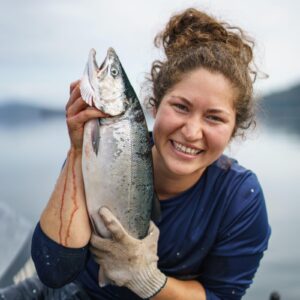
Community Resource Strategist
The potluck at the Keex’ Kwaan Traditional Food Fair. Photo credit: Bethany Sonsini Goodrich
A look back at the Keex’ Kwaan Traditional Food Fair that took place earlier this spring
This story was first published on Sustainable Southeast Partnership’s monthly column in Juneau Empire and on Sustainable Southeast Partnership’s blog.
When does a traditional food celebration begin in the Tlingit community of Kake (Keex’ Kwaan)? It begins before the first guest arrives, when the cooks start prepping herring eggs, deer, moose, and halibut for the big meal. It takes place in kitchens across the community as people prepare their halibut, seaweed, and berry dessert dishes to bring to the cooking contest. The celebration is happening when volunteers gather in the kitchen of Miakah Nix and Carson Viles, two of the event organizers and Ecotrust staff, where they teach each other and learn to butcher a deer donated by a local hunter on the kitchen table. It is happening when the deer gave its life to the hunter, who put it away for winter to share with others. The celebration begins before the planning committee’s first meeting months before the event and before any requests for funding are submitted.
The celebration also happens during the Organized Village of Kake’s Youth Culture Camp and summer activities of the Alaskan Youth Stewards crew, who harvested and processed cases of jarred berries and fish the summer before the event. And also with gratitude, expressed by the ancestors who walked these lands, who floated these waters, and who nourished their existence and a legacy of descendants by learning to thrive on the foods of this place since time immemorial. Echoes of this relationship to the homelands reverberate throughout the generations along with the knowledge, skills, leadership, and values that accompany the foods themselves.
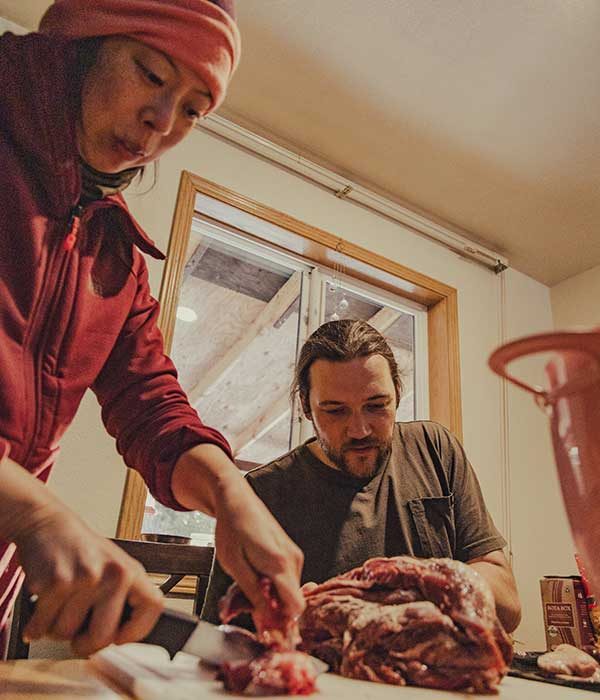
Jennifer Nu (left), Carson Viles (right), and other friends butcher deer meat together in Carson and Miakah’s home. Photo credit: Ḵaa Yahaayí Shkalneegi Muriel Reid
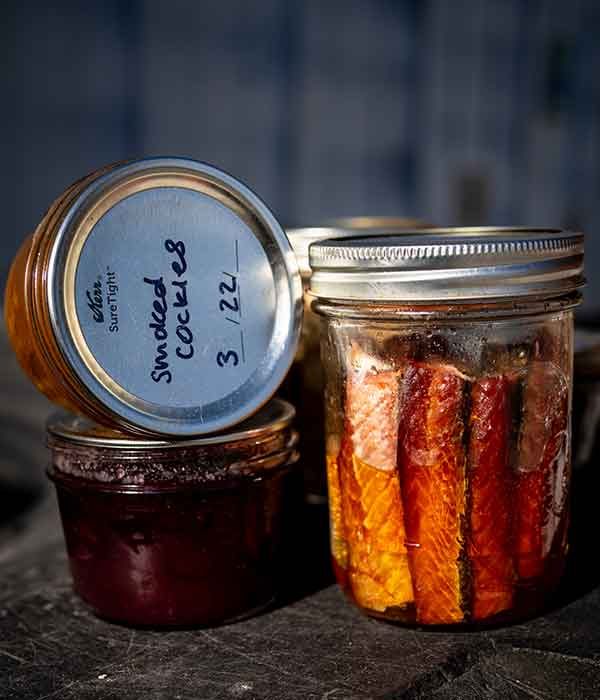
Home canned traditional foods, including smoked cockles and salmon. Photo credit: Bethany Sonsini Goodrich
With generous support from the First Nations Development Institute and Sealaska, Ecotrust’s Kake-based staff joined forces with staff of the Organized Village of Kake (OVK) to host the Keex’ Kwaan Traditional Food Fair in early March. This event brought together more than 130 community members and the Keex’ Kwaan Dancers (a Tlingit traditional song and dance group) for an evening of celebration and good food. Continuing the legacy of seasonal community harvest events organized by local leaders for many decades, this event was also inspired by Huna’s Traditional Food Fair, an annual event that began in 2017. In Kake, the Traditional Food Fair was supported by volunteers and generous food and prize donations from community members including the help of Kake’s all-star basketball teams.
“Traditional foods are our lifeblood and joy as Native Peoples. The People of Keex’ Kwaan have fought for and continue to work hard, every day, to carry on this way of life,” shared Miakah Nix. Miakah and her partner Carson Viles are community members and Ecotrust employees who helped organize the Food Fair.
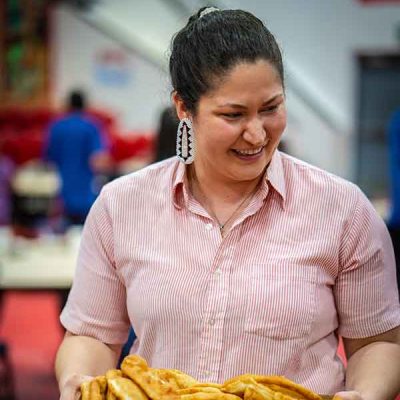
“
Our event brings the community together to celebrate for ‘no good reason,’ except that who we are and the traditions we carry forward are every bit good reasons to celebrate.
The people of Kake take special care of their homelands and there is a lot of pride in that! So, I thought, ‘Let’s party… Native style!’
—Miakah Nix
In the kitchen, chef Tony Abbott, helper John Williams Sr., and volunteers prepared and cooked for much of the day to prepare a delicious meal of deer and moose adobo, fried halibut, herring egg salad, crab salad, and Raven’s Delight (party berries). Smiles, laughter, and classic rock emanated from the kitchen. According to Tony, these are teachings from the elders: “The energy you put in the food, you want your heart and your mind to be in the right place because you are sharing it with the public. That’s why there are good vibes in the kitchen, sharing stories.”
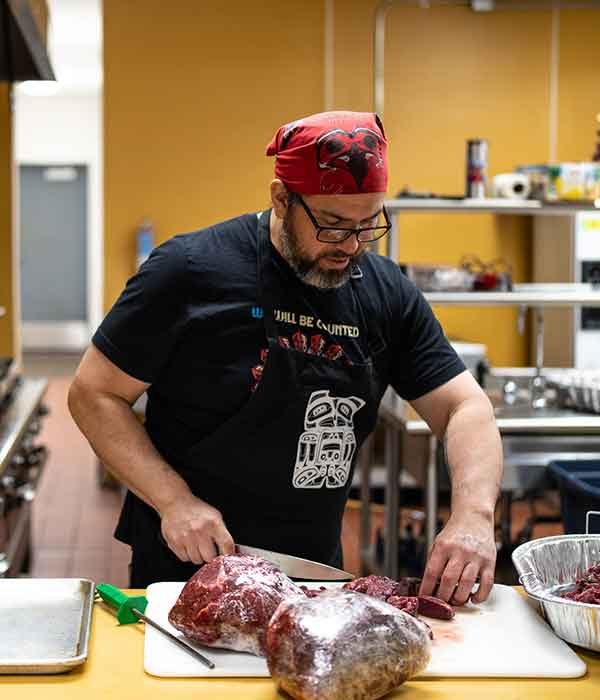
Chef Tony Abbott prepares deer and moose meat. Photo credit: Bethany Sonsini Goodrich
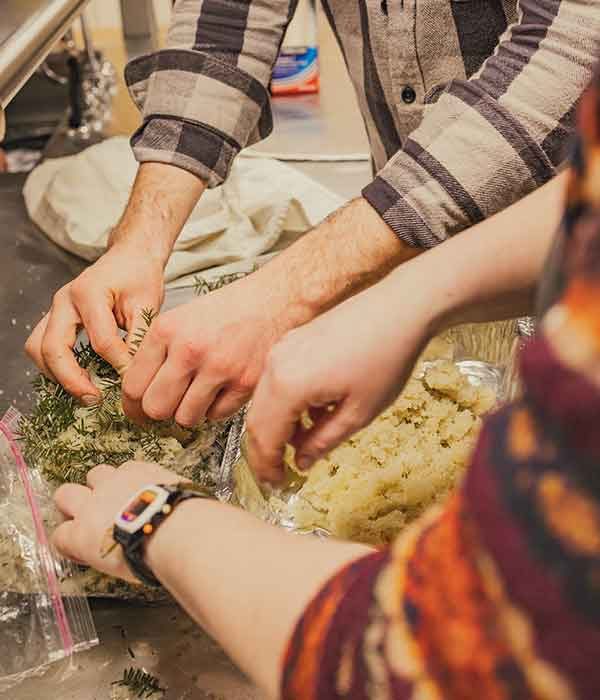
Kitchen volunteers clean herring eggs off of hemlock branches. Photo credit: Ḵaa Yahaayí Shkalneegi Muriel Reid
The stories of the traditional foods cooked and distributed at the event are connected to the community members who harvested, processed, and donated the foods, including OVK’s Youth Culture Camp and the Alaskan Youth Stewards crew. Traditional foodways emphasize the transferral of practical skills related to harvesting and putting food away for winter, in addition to leadership skills and emotional intelligence.
“You gotta have your heart and your mind in the right spot, otherwise your fish will fall off the racks, your jars will crack, or you nick yourself because you’re rushing or not paying attention,” explained Tony. “If something is going wrong, you’re not centered. You’re distracted. Take a step back and ask, ok, what’s bothering me?” Self-awareness and reflective processing are also valuable skills for thriving in today’s world.
“It’s not just food,” added Tony. “It’s everything we do. Do we help our neighbors? Do we help our children as much as we help our elders? Everything we do is with care, or we try to. How we go out and hunt, how we treat things. We are stewards of the land, sea and air—we make sure the cycles keep returning and what we do ensures that it returns.”
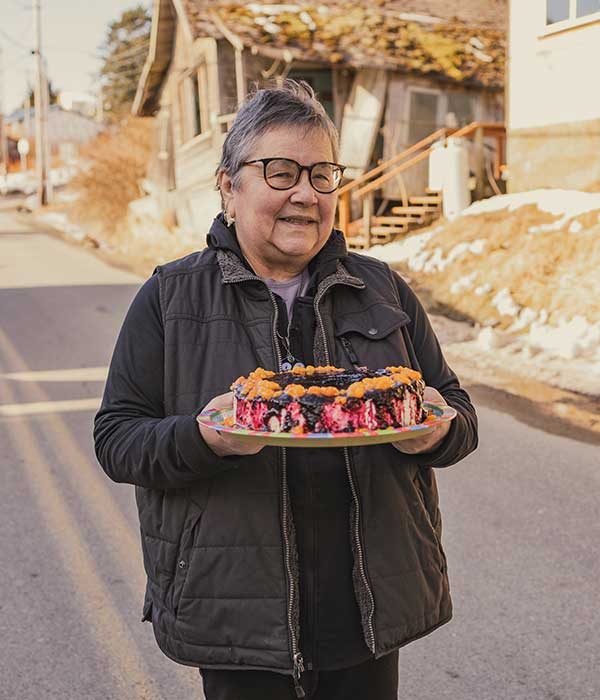
Edna Jackson won best in show for her dish called Granddaughter’s Cheesecake. Photo credit: Ḵaa Yahaayí Shkalneegi Muriel Reid
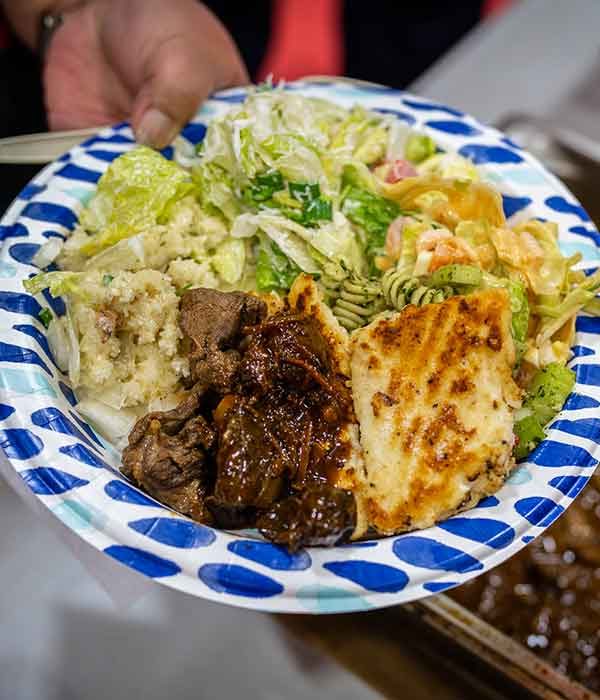
A plate full of traditional foods from the Keex’ Kwaan Traditional Food Fair: (clockwise from top of the plate) smoked salmon pesto pasta salad, crab salad, fried halibut, moose adobo, and herring egg salad. Photo credit: Bethany Sonsini Goodrich
Part of the cycle also involves the generosity and patience of older generations who teach and mentor younger generations in becoming leaders. The evening event included a cooking competition for three categories: baked halibut, seaweed, and berry dessert dishes. Sixteen community members of all ages participated, arriving with mouthwatering dishes that spanned seaweed and salmon chop suey to cloudberry cheesecake. Experienced local event organizers Georgie and Anthony Gastelum were happy to help mentor Miakah and Carson with setting up the gym and running the competition. “The things that we learned over the course of years of hosting food competitions were new to them. That’s kind of the cycle of life—people who have been here awhile share with people whose things are newer to them,” said Georgie Davis-Gastelum.
Also joining the food competition crew was volunteer Josiah Jackson, a high school student and Alaska Youth Stewards crew member, who helped with registering entries and skillfully plating the dishes for the four judges which included three elders and one youth representative.
For Georgie and many others, traditional foods create opportunities for new connections, and also memories of those who came before. “People say that when we put up our traditional food, it connects us to our ancestors,” she said. “Whenever we smoke fish, or make jam, or put up seaweed, we remember the people who taught us. There’s always a connection between those who taught you, others who’ve gone on.”
The evening closed with the Keex’ Kwaan dancers taking the floor in Kake for the first time since the COVID-19 pandemic. The dancers led several songs, inviting community members to join them in celebrating the traditional foods of Keex’ Kwaan. “Our traditional foods are a cornerstone of who we are, a cornerstone of our culture,” reflected Simon Friday, who volunteered and attended the event. “It’s nice when we as a community can get together and share a meal and not only food but each other’s company. I heard some ‘auntie laughs,’ and that definitely warms your heart.”
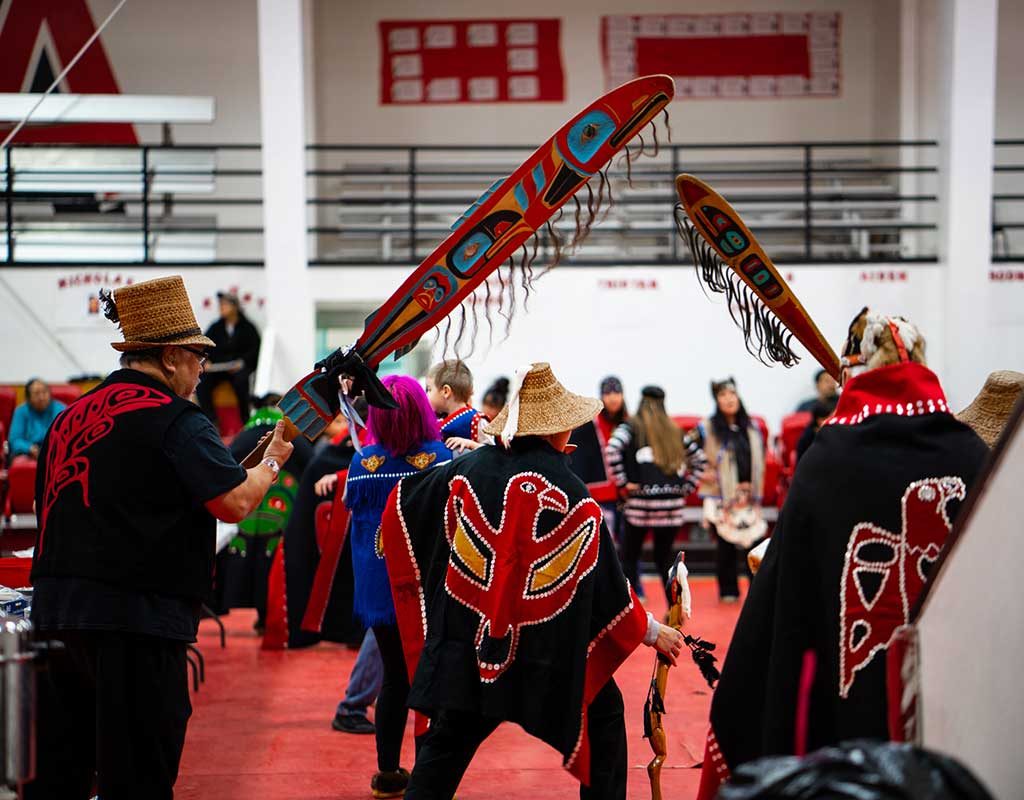
Keex’ Kwaan dancers take the floor for their first performance in Kake since before the pandemic. Photo credit: Bethany Sonsini Goodrich
The food fair organizers would like to express appreciation and gratitude to our partners, sponsors, and the following people for making this event possible: Organized Village of Kake, Sustainable Southeast Partnership, First Nations Development Institute, Sealaska, and Edgerton Foundation.
Congratulations to all those who cooked dishes for the cooking competition and judges—all are winners! Many thanks to all the cooks and volunteers, and to all the community members who donated food and prizes for the event. Gunalchéesh, haw’aa to everyone who came to share food, dance, song, and be in community.
Planning Committee Members: Miakah Nix, Carson Viles, Courtney James, Benson James, Kendall Jackson, Mona Evan, Dawn Jackson, Paulette Jackson, Kelli Jackson, Danielle Knudsen, and Anthony Gastelum.
Sponsors: Alaska Seaplanes, Alaska Nugget Outfitters, Bear Crossing Gifts, Sagebrush Dry Gear, Juneau Greens, Barnacle Foods, SEARHC, Jerry’s Meats, Alaska Marine Lines and Arrowhead, and SOS True Value.
Thank you to the cooking contest judges: Joel Jackson, Martha Thomas, Rocky Jackson, and Judy Davis.
Cooking contest mentors: Georgie and Anthony Gastelum
A special thanks to Tony Abbott and John Williams Sr. for putting together such an amazing meal. And the volunteers in the kitchen and beyond: Josiah Jackson, Christy Ruby, Muriel Reid, Bethany Goodrich, Jennifer Nu, Shawn Merry, Kelli Jackson, Sean Johnson, Simon Friday, Dawn Jackson, Chelsea Lewis, Greta Healy, John Peterka, Kymani Lodges, Lindsey Pierce, Meghan Stangeland, and Wilfred Skeek.
Frybread cooks: Charlotte, Adam, and Claire Davis
Thank you to those who donated to the public meal: Nancy Bean, Michael Dalton, David and Bunny James, David Carl, Mike Jackson, Jillian Jackson, Edna Jackson, and Shawaan Jackson-Gamble.
Acknowledgements:
Rocky Pass Tannery
Keex’ Kwaan Dancers
2022 OVK Youth Culture Camp Participants
2022 Alaskan Youth Stewards Crew – Alexis Copsey, Josiah Jackson, Aiden Clark, Jillian Jackson, Dominic Ross, Eloise Peabbles
Kake High School girls’ basketball team and Coach Debbie Johnson
Kake High School boys’ basketball team and Coach Anthony Ross
Ken Jackson Sr.
Dr. Ruth Demmert
Lloyd Davis
We apologize for any names that we may have missed. We’re grateful for everyone who pitched in to make this event happen—it really does take a village!

Blog
PHOTO ESSAY | On September 8, 2018, more than 75 Hoonah locals headed for the Yaakw Kahidi (Canoe Shed) for the Huna Traditional Food Fair. Together, while gathering over our favorite foods and with community members of all ages, we celebrated the Xunaa Tlingit Way of Life. Photos by Ian Johnson.

BLOG
PHOTO ESSAY | Miakah Nix has spent her summer based in SE Alaska working as Ecotrust’s Indigenous fellow with the Hoonah Native Forest Partnership (HNFP). Part of her work has been collaborating with other local community organizations for the Huna Traditional Food Fair. Miakah shares photos of their preparations, gathering sukkádzi (beach asparagus), lóol (fireweed flowers), catching and preparing salmon, all the while strengthening community relationships and celebrating the Xunáa Tlingit way of life.